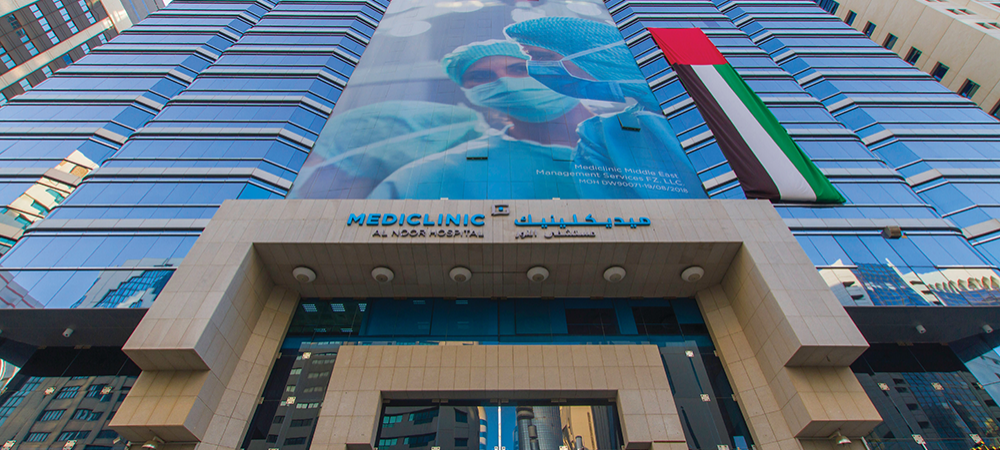Mediclinic Middle East (MCME), one of the largest private healthcare groups in the UAE, is implementing TrakCare from InterSystems across its extensive network. Its deployment, including the latest example at Mediclinic Al Noor Hospital, enables the group’s care providers to have a holistic view of each patient’s clinical, administrative and financial information at any given time. Donna Lunn, Chief Information Officer at Mediclinic Middle East, tells us more.
InterSystems, a global leader in Information Technology platforms for health, business and government applications, has announced that Mediclinic Al Noor Hospital has successfully implemented InterSystems TrakCare as its unified healthcare information system. The recent go-live at Al Noor Hospital represents the seventh successful implementation of TrakCare across the Mediclinic network.
Mediclinic Al Noor Hospital offers a range of primary, secondary and
tertiary services.
Providing a seamless patient experience combined with high standards in safety
and efficiency is at the heart of Mediclinic Al Noor Hospital.
Over the years, the hospital has earned its reputation for leading the way in ground-breaking procedures and was the first private hospital in Abu Dhabi to offer IVF services and open-heart surgery. Adopting TrakCare at Mediclinic Al Noor Hospital is another testament that the hospital is at the forefront of meeting the current and future health needs of patients in the region.
Mediclinic Middle East (MCME), one of the largest private healthcare groups in the UAE, is on schedule to deploy TrakCare across all of its hospitals and clinics in the UAE. TrakCare’s Electronic Medical Record System (EMR) enables the group’s care providers to have a holistic view of each patient’s clinical, administrative and financial information at any given time.
The EMR system supports MCME medical staff in their decision-making, while creating more opportunities to offer patients an enhanced experience and seamless care journey as they spend less time waiting and avoids unnecessary tests.
The advanced interoperability that TrakCare provides, will enable Mediclinic Al Noor Hospital to exchange data with Malaffi. Malaffi is a unified health information exchange platform that enables healthcare facilities, healthcare professionals and government authorities across Abu Dhabi to access and share patients’ medical information in order to deliver better healthcare quality and enhance patient safety and overall health outcomes.

Donna Lunn, Chief Information Officer at Mediclinic Middle East
“At Mediclinic, our mission is to deliver excellent patient care and measurable quality clinical outcomes. We believe in utilising technology to achieve these goals and transform care delivery,” said Donna Lunn, Chief Information Officer at Mediclinic Middle East. “We are delighted with the successful implementation of TrakCare at Mediclinic Al Noor Hospital and look forward to future deployments of TrakCare across the remaining Mediclinic hospitals and clinics in the UAE.”
Ali Abi Raad, InterSystems Country Manager for the Middle East and India, said: “Our team consistently strives to deliver successful and timely deployments for our valued clients who place their trust in us. We are honoured that Mediclinic chose InterSystems as its partner to create the future of care in the region,
“InterSystems would like to congratulate the Mediclinic Middle East team for their hard work and dedication to Digital Transformation.”
Mediclinic Middle East operates seven hospitals in the UAE with over 900 inpatient beds as well as more than 20 clinics in Dubai, Abu Dhabi, Al Ain and Al Dhafra.
Intelligent CIO asked Donna Lunn, Chief Information Officer at Mediclinic Middle East, further questions about the implementation.
What necessitated your decision to implement InterSystems TrakCare?
In 2016, Mediclinic Middle East acquired Al Noor Hospitals Group. At that time both organisations had their own hospital information systems (HIS) which were not necessarily able to take us into the future when it came to ensuring we were prepared for future technology challenges and the disruption that was happening in healthcare.
We knew we needed a robust electronic health record (EHR) that would help us evolve. As a result, we released a request for proposal (RFP) and originally had five vendors in the selection process. After a very rigorous vetting process, it became clear InterSystems TrakCare would be the solution to best meet our current and future needs.
Why did you choose to work with the provider?
We literally had thousands of requirements that needed to be met but we knew we wanted to select a vendor that had a comprehensive suite of applications covering the entire patient journey from registration and scheduling all the way through to billing and claims processing.
Another factor became apparent when we were going on-site visits where the three short listed vendors were being used. We were impressed with the sites using TrakCare – the hospital staff clearly demonstrated to us just how user-friendly it is. TrakCare actually exceeded any other vendor in this requirement, and that was a big deciding factor for us.
Obviously, the price point also factored into that. When we looked at all the different criteria we had laid out when selecting a vendor, InterSystems TrakCare came out on top.
Can you explain the different functions you use the solution for? What sort of information is accessible through the EMR system and how does this benefit the hospital and the group?
We use TrakCare for just about everything – registration, scheduling, labs, pharmacy, test ordering and documentation, as well as the billings and claims process. With TrakCare, everything care givers need is right there – from clinical to financial data – so our team can make informed decisions quickly. The patient journey is completely seamless and avoids unnecessary testing.
In the not too distant future, we intend to implement InterSystems Patient Portal which provides functionality for the patient such as online booking of appointments, secure encrypted messaging between the patient and his/her physician, access to their EHR, and more – this will allow the patient to be an active, informed participant in their care.
What benefits do patients gain from the EHR system?
All the technology available to us through TrakCare benefits the patient. In addition to the above, it gives the care giver the ability to really understand what is going on with a patient in a comprehensive way. For example, if I am a patient and I have a known allergy and I tell that to my care giver, it gets documented in the system. In the future, if a physician orders a medication and/or food that may cause harm to the patient due to his/her allergy, an alert will notify the physician. So, the chances of a patient having an allergic reaction are minimised or pretty much non-existent, which is clearly a benefit to the patient.
You recently joined your EHR system with Malaffi, the Abu Dhabi Health Information Exchange. How does TrakCare help the group exchange data with Malaffi?
We kicked off the integration project with Malaffi at the end of July. There were other health systems within Abu Dhabi which blazed the trail for us to a certain extent, so we were able to work very quickly getting the interfaces together with integration and testing. We went live with Malaffi the week of November 10, so at this point, we are sharing data relating to a patient’s admission, discharge, or transfer (ADT), demographics and allergies.
In the next week or so, we will go live with sharing data related to patient problems as well as what’s called the embedded mode, which means a clinician, with the right access, will be able to link directly to Malaffi via an icon within TrakCare. TrakCare, because of its advanced operability, makes it easy to view a patient’s health information exchange records with a click of a button. It’s a great benefit to the clinician to be able to launch Malaffi from within TrakCare as opposed to leaving the EHR and using a web-based tool to see a patient’s record.
The ability to easily integrate with a health information exchange is important to us and a huge benefit to patient care. For example, if a patient comes to a Mediclinic facility and was seen a few months back at another provider’s hospital and received medications but doesn’t know what type of medication they were given, we will be able to see this in Malaffi. Normally, physicians aren’t privy to this information or the patient doesn’t remember clearly, so this is a huge leap in the quality of care we are able to deliver thanks to Malaffi and TrakCare.
How secure is TrakCare’s Electronic Medical Record System?
TrakCare has role-based access. We define profiles for the various staff member roles and assign access to the EHR specific to that role. So not everyone who has access to TrakCare can see everything – it’s very specific. From a security perspective, that’s very important.
Did the system require any additional training for staff?
Yes, our Learning and Development (L&D) Department designed a very robust training programme for physicians and nurses. We also have separate training programmes for the pharmacy, lab, radiology, allied health, as well as the registration, billing and claims teams.
In addition to the traditional classroom training our L&D Dept. creates videos and developed a desktop quick reference guide for physicians. As per the TrakCare training methodology, we utilise dry runs and simulations where, prior to the go-live, staff members practice by simultaneously entering patients in the HIS and EHR. This is also a way to test the system before the go-live.
Going live with a completely new system is and always will be very challenging, but this approach enables us to be as prepared as possible ensuring minimal disruption.


